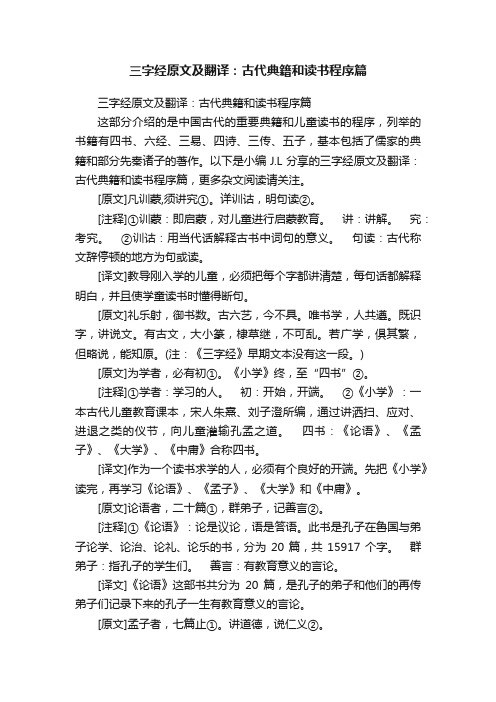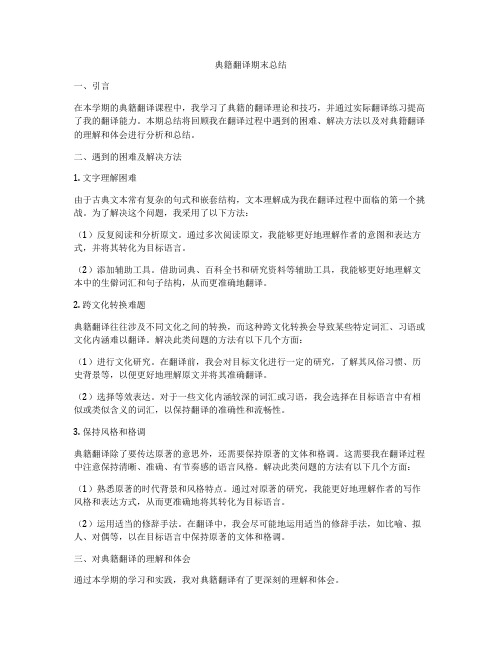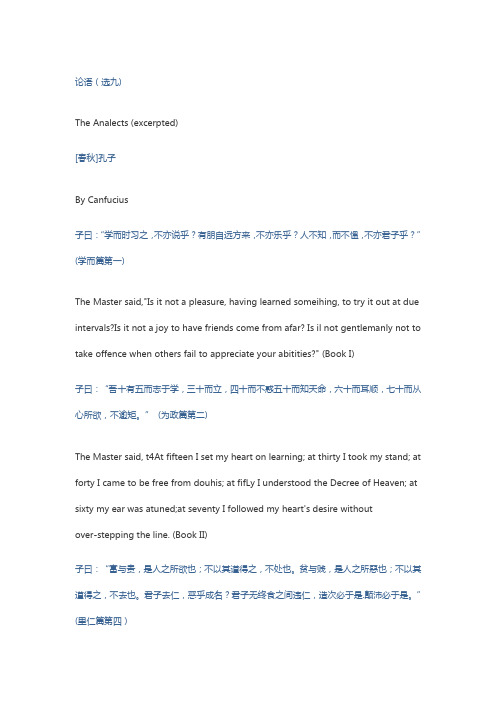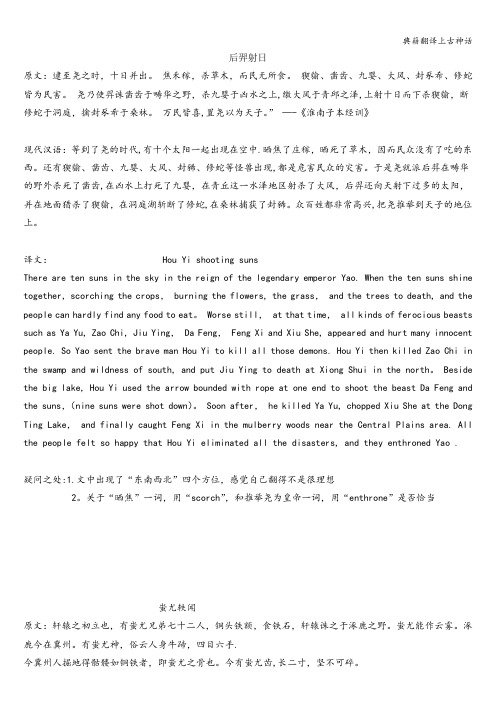典籍翻译
三字经原文及翻译:古代典籍和读书程序篇

三字经原文及翻译:古代典籍和读书程序篇三字经原文及翻译:古代典籍和读书程序篇这部分介绍的是中国古代的重要典籍和儿童读书的程序,列举的书籍有四书、六经、三易、四诗、三传、五子,基本包括了儒家的典籍和部分先秦诸子的著作。
以下是小编J.L分享的三字经原文及翻译:古代典籍和读书程序篇,更多杂文阅读请关注。
[原文]凡训蒙,须讲究①。
详训诂,明句读②。
[注释]①训蒙:即启蒙,对儿童进行启蒙教育。
讲:讲解。
究:考究。
②训诂:用当代话解释古书中词句的意义。
句读:古代称文辞停顿的地方为句或读。
[译文]教导刚入学的儿童,必须把每个字都讲清楚,每句话都解释明白,并且使学童读书时懂得断句。
[原文]礼乐射,御书数。
古六艺,今不具。
唯书学,人共遵。
既识字,讲说文。
有古文,大小篆,棣草继,不可乱。
若广学,俱其繁,但略说,能知原。
(注:《三字经》早期文本没有这一段。
) [原文]为学者,必有初①。
《小学》终,至“四书”②。
[注释]①学者:学习的人。
初:开始,开端。
②《小学》:一本古代儿童教育课本,宋人朱熹、刘子澄所编,通过讲洒扫、应对、进退之类的仪节,向儿童灌输孔孟之道。
四书:《论语》、《孟子》、《大学》、《中庸》合称四书。
[译文]作为一个读书求学的人,必须有个良好的开端。
先把《小学》读完,再学习《论语》、《孟子》、《大学》和《中庸》。
[原文]论语者,二十篇①,群弟子,记善言②。
[注释]①《论语》:论是议论,语是答语。
此书是孔子在鲁国与弟子论学、论治、论礼、论乐的书,分为20篇,共15917个字。
群弟子:指孔子的学生们。
善言:有教育意义的言论。
[译文]《论语》这部书共分为20篇,是孔子的弟子和他们的再传弟子们记录下来的孔子一生有教育意义的言论。
[原文]孟子者,七篇止①。
讲道德,说仁义②。
[注释]①孟子:孟轲。
作《孟子》七篇。
②讲:讲述。
说:宣传,谈论。
[译文]《孟子》这部书是孟轲写的,共七篇,内容是有关讲述道德、宣传仁义等优良品行的言论。
典籍翻译 先秦寓言

杞人忧天原文:杞国有人忧天地崩坠,身亡所寄,废寝食者。
又有忧彼之所忧者,因往晓之,曰:“天,积气耳,无处无气。
若屈伸呼吸,终日在天中行止,奈何忧崩坠乎?”其人曰:“天果积气,日、月、星宿,不当坠邪?”晓之者曰:“日、月、星宿,亦积气中之有光耀者,只使坠,亦不能有所中伤。
”其人曰:“奈地坏何?”晓之者曰:“地,积块耳,充塞四虚,无处无块。
若躇步跐蹈?终日在地上行止,奈何忧其坏?”其人舍然大喜,晓之者亦舍然大喜。
现代汉语:古代杞国有个人担心天会塌、地会陷,自己无处存身,便食不下咽,寝不安席。
另外又有个人为这个杞国人的忧愁而忧愁,就去开导他,说:“天不过是积聚的气体罢了,没有哪个地方没有空气的。
你一举一动,一呼一吸,整天都在天空里活动,怎么还担心天会塌下来呢?”那人说:“天是气体,那日、月、星、辰不就会掉下来吗?”开导他的人说:“日、月、星、辰也是空气中发光的东西,即使掉下来,也不会伤害什么。
”那人又说:“如果地陷下去怎么办?”开导他的人说:“地不过是堆积的土块罢了,填满了四处,没有什么地方是没有土块的,你行走跳跃,整天都在地上活动,怎么还担心地会陷下去呢?”(经过这个人一解释),那个杞国人才放下心来,很高兴;开导他的人也放了心,很高兴。
People of state Qi worried about the falling down of the sky译文:There is a man in the ancient state of Qi worried that the sky would fall down, the land would subside, and he can find no place to live in. So he lost any appetite for food and couldn’t fall asleep every night. Another person who worried about him came to see him and try to persuade him. He said:“the sky is merely comprised of accumulated gases, there doesn’t exist anywhere that does not have air. Each of your moves and behaviors and each of your inhalation and exhalation are all under the dome all day long, how should you worry about the falling down of the sky?”. The people of state Qi asked: “now that the sky consists of gases, would the sun, the moon, the stars, and the constellations fall down?”.The man who persuaded him said: “the sun, the moon, the stars and the constellations are the flashing things in the air,and they won’t cause any harm even if they fall down.”. The Qi people kept asking: “what if the land subsides?” The man answered: “well, the land is no more than accumulated clods of soil, filling everywhere andthere also does n’t exist anywhere that does not possess soil clods. You walk and jump on the land, how should you worry about the subsidence of the land?”. (After the man’s persuasion and explanation),the Qi people set his mind at rest and very pleased. So the man who persuaded him also felt very happy and didn’t worry any more.疑问之处:1.“天塌”翻成fall down2.“地陷”翻成subside,表示塌陷的词有很多,subside多指因挖矿造成的地陷3.“天是积聚的气”理解为天空由各种气体构成是否更恰当4.“一呼一吸”是否可以翻成“inhalation”和“exhalation”5.“辰”指有一个意思指北斗星,可以翻成constellation么6.“填满了四处”该如何理解,如何翻译7. 题目的翻译吕梁丈夫原文:孔子观于吕梁,悬水四十仞,流沫三拾里,鼋鼍鱼鳖之所不能游也。
浅谈典籍翻译之道

浅谈典籍翻译之道
作为翻译工作者,我们常常被要求翻译各种典籍,如《论语》、《道德经》、《诗经》等等,这些典籍对于我们对中华文化的理解有着举足轻重的作用。
但是,由于这些典籍存
在词汇、语法上的极大差异,因此翻译难度也很高。
那么,该如何进行典籍翻译呢?
首先,典籍翻译需要有扎实的语言基础。
中文中有许多古词汇、古语法,且这些语言
材料与现代汉语有很大的差异。
因此,一个翻译人员必须具有扎实的语言功底,才能够准
确理解、翻译典籍中的内容。
其次,典籍翻译需要有深刻的文化素养。
典籍虽然是语言的载体,但它们同时也是中
华文化的重要组成部分。
若想准确翻译出典籍中的精华内容,就需要读者有深入了解中华
文化的文化素养,懂得其中的含义。
再次,典籍翻译需要有丰富的阅读体验。
中国的典籍之所以能够成为经典,是因为它
们对于人类生活、思维、道德、社会价值等方面的深刻观察和概括。
因此,一个翻译人员
必须要有足够的阅读体验,用心感悟、领悟典籍中所蕴含的内涵和意义。
最后,典籍翻译需要有创造性思维。
虽然典籍是经典,但它们毕竟是写在古代的,与
现代汉语和语言环境存在许多的不同。
因此,翻译人员在进行典籍翻译时需要有创造性思维,灵活运用各种翻译技巧,使得翻译的结果既符合原书的内涵,又通俗易懂。
总之,典籍翻译是一项极具挑战性的翻译工作。
它需要翻译人员具备扎实的语言基础、深刻的文化素养、丰富的阅读体验和创造性的思维。
只有这样,才能够准确翻译出典籍中
的意义和精华,将中国文化传承下去。
典籍翻译(新)

时代背景
• • • • • • 社会急剧动荡 地主阶级的残酷剥削 清军的烧杀掳掠 农民起义军的南征北战 连年的水旱灾害 文字狱 社会经济严重破坏 城市凋敝 白骨蔽野 遍地疮痍 田园荒芜 文人悲怆
蒲松龄个人经历
• 蒲松龄(1640-1715),明崇祯十三年─清康熙五十四年,字留 仙,又字剑臣,别号柳泉居士,世称聊斋先生,清代杰出文 学家,小说家,山东省淄川县(现淄博市淄川区洪山镇)蒲 家庄人。 • 明、清两个朝代相交替的时代,当时的社会动荡不堪,人民 的生活及社会风俗都受到了巨大的影响。出身于一个逐渐败 落的地主家庭,屡应省试不第,直至71岁时始成贡生。 • 他用毕生精力完成《聊斋志异》8卷、491篇,约40余万字。
• • • • •
• • • • • • • • • • • • • • •
Tune to “Sand and Sky”—Autumn Thoughts (Schlepp 译) Dry vine, old tree, crows at dusk. Low bridge, stream running, cottages, Ancient road, west wind, lean nag, The sun westering And one with breaking heart at the sky‟s edge. Tune: Tian Jin Sha (丁祖荫,Burton Raffel 译) Withered vines hanging on old branches, Returning crows croaking at dusk. A few houses hidden past a narrow bridge And below the bridge a quiet creek running. Down a worn path, in the west wind, A lean horse comes plodding. The sun dips down in the west, And the lovesick traveler is still at the end of the world.
典籍翻译期末总结

典籍翻译期末总结一、引言在本学期的典籍翻译课程中,我学习了典籍的翻译理论和技巧,并通过实际翻译练习提高了我的翻译能力。
本期总结将回顾我在翻译过程中遇到的困难、解决方法以及对典籍翻译的理解和体会进行分析和总结。
二、遇到的困难及解决方法1. 文字理解困难由于古典文本常有复杂的句式和嵌套结构,文本理解成为我在翻译过程中面临的第一个挑战。
为了解决这个问题,我采用了以下方法:(1)反复阅读和分析原文。
通过多次阅读原文,我能够更好地理解作者的意图和表达方式,并将其转化为目标语言。
(2)添加辅助工具。
借助词典、百科全书和研究资料等辅助工具,我能够更好地理解文本中的生僻词汇和句子结构,从而更准确地翻译。
2. 跨文化转换难题典籍翻译往往涉及不同文化之间的转换,而这种跨文化转换会导致某些特定词汇、习语或文化内涵难以翻译。
解决此类问题的方法有以下几个方面:(1)进行文化研究。
在翻译前,我会对目标文化进行一定的研究,了解其风俗习惯、历史背景等,以便更好地理解原文并将其准确翻译。
(2)选择等效表达。
对于一些文化内涵较深的词汇或习语,我会选择在目标语言中有相似或类似含义的词汇,以保持翻译的准确性和流畅性。
3. 保持风格和格调典籍翻译除了要传达原著的意思外,还需要保持原著的文体和格调。
这需要我在翻译过程中注意保持清晰、准确、有节奏感的语言风格。
解决此类问题的方法有以下几个方面:(1)熟悉原著的时代背景和风格特点。
通过对原著的研究,我能更好地理解作者的写作风格和表达方式,从而更准确地将其转化为目标语言。
(2)运用适当的修辞手法。
在翻译中,我会尽可能地运用适当的修辞手法,如比喻、拟人、对偶等,以在目标语言中保持原著的文体和格调。
三、对典籍翻译的理解和体会通过本学期的学习和实践,我对典籍翻译有了更深刻的理解和体会。
首先,我认识到典籍翻译不仅是将文字从一种语言转换为另一种语言,更重要的是传达原著的文化内涵和精神。
典籍作为一个民族或一个文化的瑰宝,包含着丰富的思想、智慧和历史文化。
中国文化典籍英语翻译及赏析12:孔丘论语《论语》

论语(选九)The Analects (excerpted)[春秋]孔子By Canfucius子曰:“学而时习之,不亦说乎?有朋自远方来,不亦乐乎?人不知,而不慍,不亦君子乎?”(学而篇第一)The Master said,"Is it not a pleasure, having learned someihing, to try it out at due intervals?Is it not a joy to have friends come from afar? Is il not gentlemanly not to take offence when others fail to appreciate your abitities?" (Book I)子曰:“吾十有五而志于学,三十而立,四十而不惑五十而知天命,六十而耳顺,七十而从心所欲,不逾矩。
”(为政篇第二)The Master said, t4At fifteen I set my heart on learning; at thirty I took my stand; at forty I came to be free from douhis; at fifLy I understood the Decree of Heaven; at sixty my ear was atuned;at seventy I followed my heart's desire withoutover-stepping the line. (Book II)子曰:“富与贵,是人之所欲也;不以其道得之,不处也。
贫与贱,是人之所惡也;不以其道得之,不去也。
君子去仁,恶乎成名?君子无终食之间违仁,造次必于是.颠沛必于是。
”(里仁篇第四)The Master said, “WeaJth and high station are whai men desire hut unless [ got them in the right way I could not remain in them. Poverty and low station are what men dislike, but even if I did not get them in the right way I would noi try to escape frum them."If the gentleman forsakes benevolence, in what way tan he make a name for himself? The gentleman never deserts benevolence, not even for as long us it takes to eat a meal.If he hurries and stumbles one muy be sure that it is in benevolence that he does so."(Book IV)叶公问孔子于子路,子路不对,子曰:“女奚不曰,其为人也,发愤忘食,乐以忘忧,不知老之将至云尔。
典籍翻译的下一步

典籍翻译的下一步目录一、内容简述 (2)1. 当前典籍翻译的重要性 (3)2. 典籍翻译面临的挑战与机遇 (4)3. 本文目的与结构概览 (5)二、典籍翻译现状分析 (6)1. 当前典籍翻译的总体水平 (7)2. 典籍翻译中存在的难点与问题 (8)3. 典籍翻译现状的成因分析 (9)三、典籍翻译的发展趋势 (10)1. 全球化背景下的典籍翻译趋势 (12)2. 数字化与网络化对典籍翻译的影响 (13)3. 跨文化交流中的典籍翻译走向 (14)四、典籍翻译的下一步策略 (15)1. 整合策略 (17)2. 创新策略 (18)3. 国际化策略 (19)五、技术应用与创新 (21)1. 人工智能与机器翻译在典籍翻译中的应用 (22)2. 大数据与云计算对典籍翻译的支持 (24)3. 数字化技术在典籍翻译出版中的应用 (25)六、人才培养与团队建设 (26)1. 典籍翻译人才的培养模式与路径 (27)2. 团队建设与协作机制构建 (29)3. 跨学科合作,提升翻译水平 (30)七、质量控制与评估机制 (31)1. 翻译过程中的质量控制措施 (32)2. 翻译成果的评估标准与方法 (33)3. 建立完善的评估机制,提升翻译质量 (35)八、跨文化交流与传播策略 (36)1. 跨文化交流中的典籍翻译策略 (37)2. 典籍翻译的传播途径与方式创新 (39)3. 提高典籍翻译的可见度与影响力 (40)九、案例分析与实践探索 (41)一、内容简述在当今全球化日益加深的背景下,跨文化交流与合作显得尤为重要。
典籍作为人类智慧的结晶,承载着不同文化的精髓与历史传承。
典籍翻译成为了连接不同文明、促进文化互鉴的重要桥梁。
典籍翻译的下一步工作,首先需要关注的是翻译质量。
高质量的翻译不仅能够准确传达原文的意思,还能保留原典籍的文化特色和语言风格。
这就要求翻译者具备深厚的文学素养和跨文化交际能力,还需要掌握专业的翻译技巧和方法。
典籍翻译上古神话

后羿射日原文:逮至尧之时,十日并出。
焦禾稼,杀草木,而民无所食。
猰貐、凿齿、九婴、大风、封豖希、修蛇皆为民害。
尧乃使羿诛凿齿于畴华之野,杀九婴于凶水之上,缴大风于青邱之泽,上射十日而下杀猰貐,断修蛇于洞庭,擒封豖希于桑林。
万民皆喜,置尧以为天子。
”—-《淮南子本经训》现代汉语:等到了尧的时代,有十个太阳一起出现在空中.晒焦了庄稼,晒死了草木,因而民众没有了吃的东西。
还有猰貐、凿齿、九婴、大风、封豨、修蛇等怪兽出现,都是危害民众的灾害。
于是尧就派后羿在畴华的野外杀死了凿齿,在凶水上打死了九婴,在青丘这一水泽地区射杀了大风,后羿还向天射下过多的太阳,并在地面猎杀了猰貐,在洞庭湖斩断了修蛇,在桑林捕获了封豨。
众百姓都非常高兴,把尧推举到天子的地位上。
译文: Hou Yi shooting sunsThere are ten suns in the sky in the reign of the legendary emperor Yao. When the ten suns shine together, scorching the crops, burning the flowers, the grass, and the trees to death, and the people can hardly find any food to eat。
Worse still, at that time, all kinds of ferocious beasts such as Ya Yu, Zao Chi, Jiu Ying, Da Feng, Feng Xi and Xiu She, appeared and hurt many innocent people. So Yao sent the brave man Hou Yi to kill all those demons. Hou Yi then killed Zao Chi in the swamp and wildness of south, and put Jiu Ying to death at Xiong Shui in the north。
- 1、下载文档前请自行甄别文档内容的完整性,平台不提供额外的编辑、内容补充、找答案等附加服务。
- 2、"仅部分预览"的文档,不可在线预览部分如存在完整性等问题,可反馈申请退款(可完整预览的文档不适用该条件!)。
- 3、如文档侵犯您的权益,请联系客服反馈,我们会尽快为您处理(人工客服工作时间:9:00-18:30)。
外国语言文化学院全日制硕士研究生课程作业成绩:科目:典籍翻译任课教师:凌海衡学号:2011021293姓名:高云专业:英语笔译年级:11级完成时间:2012年09月01日至乐天下有至乐无有哉?有可以活身者无有哉?今奚为奚据?奚避奚处?奚就奚去?奚乐奚恶?Utmost HappinessIs there utmost happiness in the world? Is there a way to save one’s own skin in security? If so, what can you do now and why is that? What should you avoid and where would you stay? Where should you approach and what would you abandon? What should you like and what would you detest?夫天下之所尊者,富贵寿善也;所乐者,身安厚味美服好色音声也;所下者,贫贱夭恶也;所苦者,身不得安逸,口不得厚味,形不得美服,目不得好色,耳不得音声。
若不得者,则大忧以惧,其为形也亦愚哉!What people advocate are wealthy, dignity, longevity and reputation; what makes people happy are comfort of body, abundance of food, glorious costumes, pleasing colors, sweet music; what people despise are poverty, abjection, ephemeral and notoriety; what people dislike are discomfort of body, shortage of food, no glorious costumes to wear, no pleasing colors to see, no sweet music to hear. People will be in great distress and fear once they could not get them, but isn’t it too stupid to treat their body like this?夫富者,苦身疾作,多积财而不得尽用,其为形也亦外矣!夫贵者,夜以继日,思虑善否,其为形也亦疏矣!人之生也,与忧俱生。
寿者惛惛,久忧不死,何之苦也!其为形也亦远矣!烈士为天下见善矣,未足以活身。
吾未知善之诚善邪,诚不善邪?若以为善矣,不足活身;以为不善矣,足以活人。
故曰:"忠谏不听,蹲循勿争。
"故夫子胥争之以残其形;不争,名亦不成。
诚有善无有哉?The rich people toil themselves and work very hard to accumulate large amount of wealth but could not use them up. To treat their own body in such a way, isn’t it a way of not cherishing his own body? The dig nified people keep thinking of position and salary all day in case that crisis may fall. To treat one’s own body in such a way,isn’t it too negligent? People are born with melancholy and gloom. Those who live long muddle all day and are in gloom for long b ut would not die, but isn’t it a suffering? To treat one’s own body in such a way, isn’t it too unreasonable? The heroes who sacrifice themselves for others are praised by all the people but fail to save their own lives. I could not define whether this kind of behavior is truly kind or not. If it is, it is a pity that he himself could not survive. If it isn’t, he has saved others’ life after all. Therefore, someone said: “If your sincere advices are rejected, please step back and do not argue.” Wuzixu suffe red a lot for arguing to offer advice. However, he would not become famous if he did not do so? Therefore, does kindness really exist?今俗之所为与其所乐,吾又未知乐之果乐邪?果不乐邪?吾观夫俗之所乐,举群趣者,誙誙然如将不得已,而皆曰乐者,吾未之乐也,亦未之不乐也。
果有乐无有哉?吾以无为诚乐矣,又俗之所大苦也。
故曰:"至乐无乐,至誉无誉。
"As with what people pursue and what people enjoy today,I could not define whether they are really happiness for it or not. What people enjoy are pursue d by everyone with great resolution and brevity. It seems no one could stop it. What people consider as being happy are however not happy in my eyes. Then is there happiness in the world after all? I think being Wuwei(Inaction) is true happiness, which however is regarded as being the most painful by others. Therefore, we can say“The biggest happiness is being carefree and lighthearted, and the best praise is no praise.”天下是非果未可定也。
虽然,无为可以定是非。
至乐活身,唯无为几存。
请尝试言之:天无为以之清,地无为以之宁。
故两无为相合,万物皆化生。
芒乎芴乎,而无从出乎!芴乎芒乎,而无有象乎!万物职职,皆从无为殖。
故曰:"天地无为也而无不为也。
"人也孰能得无为哉!What is right or wrong is actually uncertain. Nevertheless, the attitude of being Wuwei can make a distinction between the two. The biggest pleasure is to live, which can only be achieved with the attitude of Wuwei. Please allow me to make an explanation: The heaven is clean and pure for being Wuwei while the earth is peace and tranquil for being Wuwei. With the proper harmony of the two, everything are produced in such a daze, leaving nobody knowing where it is from and nobody could trace their vestiges. Being complicated and numerous, everything is produced from Wuwei. Therefore, we can say: “The heaven and the earth do not intend to do anything but result in creating everything.”庄子妻死,惠子吊之,庄子则方箕踞鼓盆而歌。
惠子曰:"与人居,长子、老、身死,不哭亦足矣,又鼓盆而歌,不亦甚乎!"When Huizi went to condole with Zhuangzi when his wife died, Zhuangzi was sitting cross-legged and singing by beating pots. Huizi said to him: “She has lived together with you for her and now the children have grown up and she becomes old herself. It is OK if you do not cry for her death, but don’t you think you are going too far by singin g with beating pots?”庄子曰:"不然。
是其始死也,我独何能无概!然察其始而本无生;非徒无生也,而本无形;非徒无形也,而本无气。
杂乎芒芴之间,变而有气,气变而有形,形变而有生。
今又变而之死。
是相与为春秋冬夏四时行也。
人且偃然寝于巨室,而我噭噭然随而哭之,自以为不通乎命,故止也。
